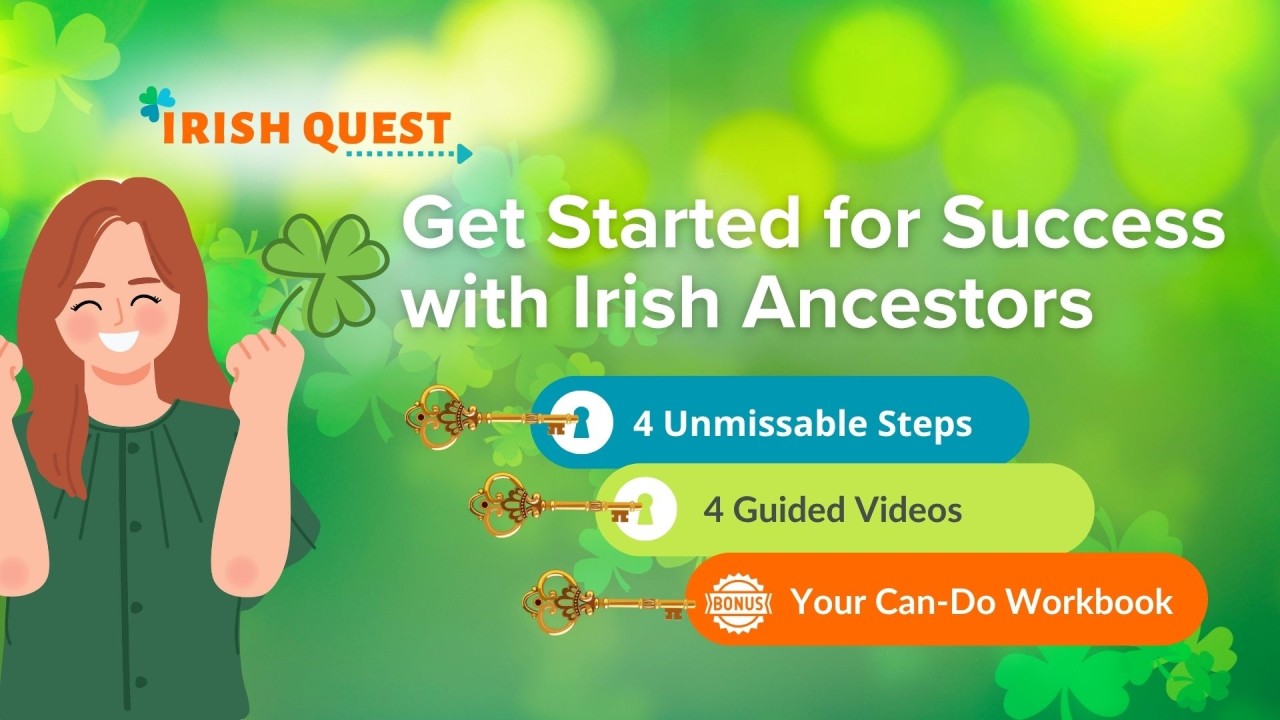Irish Mac's and O's Explained

Learn the culture of use of Irish surname prefixes like Mac, Mc, Mag, and O’ to supercharge your family history research.
If you’ve been tracing your Irish roots and keep hitting dead ends, you may be wondering if it has something to do with a missing Mac or O' in your ancestor's surname.
Why did they "Drop the O"?
The prefix Ó (meaning "from" or "descendant of") is unique to Ireland and appears in well-known surnames such as O’Brien, O’Connor, O’Neill, O’Sullivan and so on. In the Irish language, it is written as Ó and spelled aloud as "Oh-fada" (long Oh). The apostrophe form O' is used exclusively in English, originating as a practical short-hand in English writing and printing systems. (A fada that slipped around the side of the O?)
If you can imagine a phonebook in Ireland where the majority of surnames begin with O'~ you can see why record-keepers were keen to drop them. And it wasn't until the Gaelic Revivial of the late 19th century that our ancestors began to see Irish prefixes as part of their national identity and reclaim them.
Who said "Mc is Irish and Mac is Scottish"?
If you have heard "Mac is the reserve of the Scots" don't believe it. Many prominent Irish families bear Mac surnames and both forms (Mac, and its abbreviation Mc) have been used interchangeably, even within the same family line.
The use of Mc and Mac was simply down to early inconsistencies in record-keeping in Ireland. You may be surprised to find Mac abbreviated to M' in earlier records too.
The word Mac (pronounced "mock") in the Gaelic tradition of both Scotland and Ireland means "son of." For example, Mac Eoin means "son of Eoghan" or John, which anglicizes to McKeon. Your ancestor, familiar with this tradition, might have used an alias-by-translation interchangeably when asked, "What's that in English?" For instance, Mac Séain means "son of Séan" or John, which translates to Johnson in English. Look both ways.
Did My Ancestor Change Name?
When one's ancestral surname doesn't quite match the surname spelling in Ireland, it is common for family historians to ask themselves Did My Irish Ancestor Change His Name? Or assume the family surname was changed for them at Ellis Island (not true!)
In Ireland, it wasn't so long ago that a missing O' or Mac in an old Irish surname was attached to a "they took the soup" narrative - a more recent offspring of the Gaelic Revival and Irish Independence in the 20th century. When it comes to 19th-century records in Ireland, Catholic church registers included, the inclusion of the O' was rare and the spelling was anyone's guess (e.g. Burn, Birn for O'Byrne, Doud, Doody for O'Dowd).
In Ireland, surname spellings were far from fixed until well into the 20th century. That means your great-great-grandfather’s name might appear in half a dozen different forms across church registers, census returns, land records, and immigration lists.
If your instincts are now telling you to try trouble-shooting the spelling of your ancestor’s surname, you are on the right track.
Why Irish Surnames Have So Many Spellings
Before standardised spelling took hold (and even after), a variety of forces shaped how names were recorded:
-
Phonetic spelling before English was standardised — Gaelic Irish names were often written down as they sounded in the English phonetics of the time (that too has had an impact on how we pronounce them today).
-
Regional dialects — Different Irish dialects could change how a surname was pronounced, heard, and therefore spelled. Less prominent surnames also risked being absorbed by a dominant one both at home and overseas (e.g. Brannon Vs Brennan).
-
Dropped prefixes — The prefix O’ fell out of use in British record-keeping, due to the sheer volume of them. Mac was dropped in some cases but not all.
Mistaken prefixes — When the Gaelic revivial restored a confidence in the use of Irish prefixes in the late 19th century, sometimes the wrong prefix was adopted (e.g. taking an O' instead of a Mac)
-
Latinisation of Names — Medieval scribes began the pattern of giving a Latin form to Pre-Christian Irish names (e.g., Aodh recorded as Hugonis) which later influenced the surnames that came from old Gaelic Irish given names.
-
Social pressures — Families used an alias by translation to sound less “Irish” for various reasons. You may find siblings diverging on that point - one preferring a more English-sounding surname (e.g., MacAnaney as Bird. Pettit as Little) so always consider that "alias by translation" as a possible line of enquiry.
Common Surname Variation Pitfalls
1. Dropping Prefixes
A family originally called O’Dowd might appear in records as Dowd, O Dowd, Doud, or simply Dowde.
2. Switching Prefixes
Occasionally a Mac family restored an O’, or vice versa — for example, a MacCarthy becoming O’Carthy in later generations.
3. Anglicising the Gaelic Form
Ó Neachtain could become O’Naghten, O’Naughton, Naughton, Naughten, Norton, or even Knockton.
4. Regional & Dialect Effects
The surname Mac Aodha appears as Magee, Mackey, and even Hughey depending on the region.
How to Search Around the Variations
When using online archives or genealogy databases, cast your net wide:
-
Use Wildcards —
Many archives allow you to replace uncertain letters with an asterisk (*).
Example: M*Gee will return McGee, MacGee, Magee. -
Search Without the Prefix —
If you’re looking for McDermott, search ‘Dermot’ too. -
Test Multiple Prefix Formats —
Try: Mc / Mac / M’ / Mag / none. And O' in later records just in case! -
Consider Latin Originals —
Look up the Gaelic name and note its Latin baptismal equivalent in our handy Irish Names & Aliases Cheat Sheet for ideas about possible "aliases by translation". -
Learn the Root Name —
Use tools like John Grenham’s surname database and Woulfe's Irish Surnames to understand your surname’s earliest Gaelic form and spelling variations.
Practical Checklist for Irish Surname Searches
✅ Write down every spelling variation you find in one master list. My Get Started for Success Workbook is great for this.
✅ Search online records with and without prefixes.
✅ Use wildcards (*) in place of vowels and consonants
✅ Try phonetic spellings (especially in US, UK, Canadian, and Australian records).
✅ Check the 1901 Census of Ireland to see if your ancestral surname was still spelled as such in Ireland even after they left.
Remember
Irish surnames were living, evolving forms. There wasn't even a standard spelling of the original Irish surname as Gaeilge. Everything we know today is a modern construct.
The same ancestor might appear under three or four spellings over the course of a lifetime — and that’s before counting variants used by other family members.
By using wildcard searches, embracing variation, and thinking like a 19th‑century priest or tax clerk, you’ll greatly improve your chances of finding the missing pieces in your Irish family history.
Happy hunting!

Irish ancestry research should be FUN not frustrating! One you get up close and personal with your ancestors aliases so you can find them on record faster and easier.
That is why I have broken it down into 4 unmissable Can-Do Steps in my latest workbook & mini-course:

Check out my special introductory offer here:
→ [ Get Started for Success with Irish Ancestors ]
Categories: : Irish Names
 Irene ó Irish Quest
Irene ó Irish Quest 